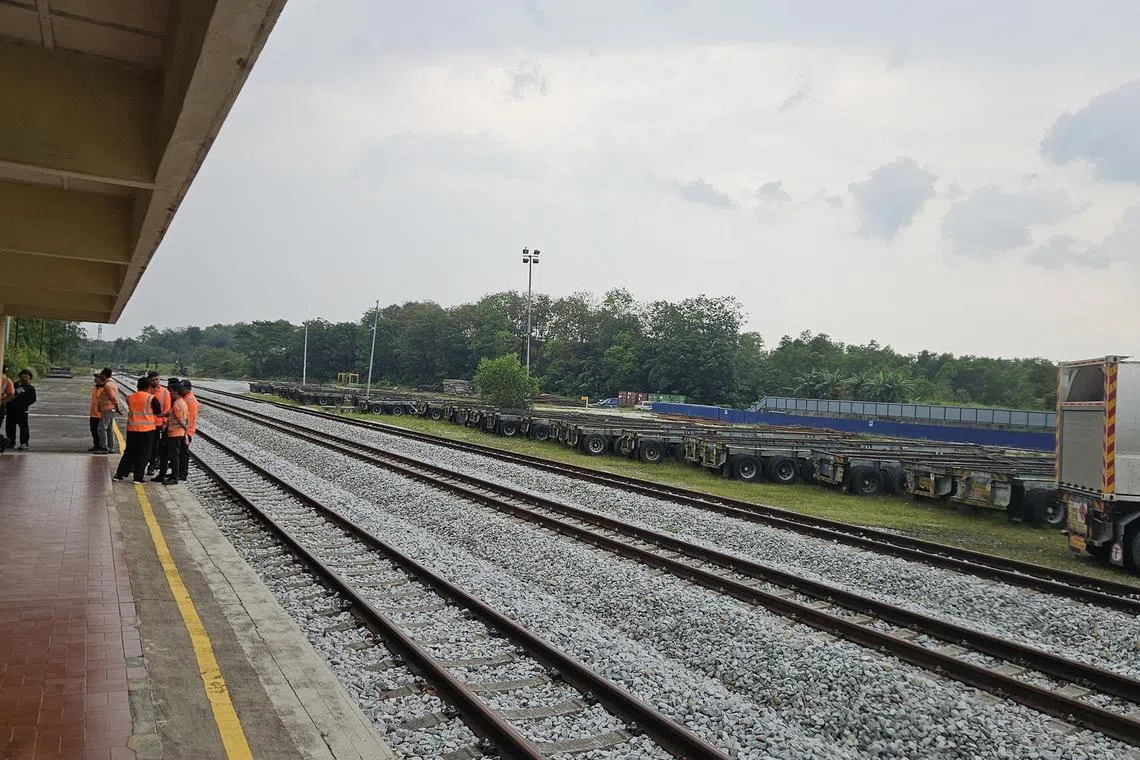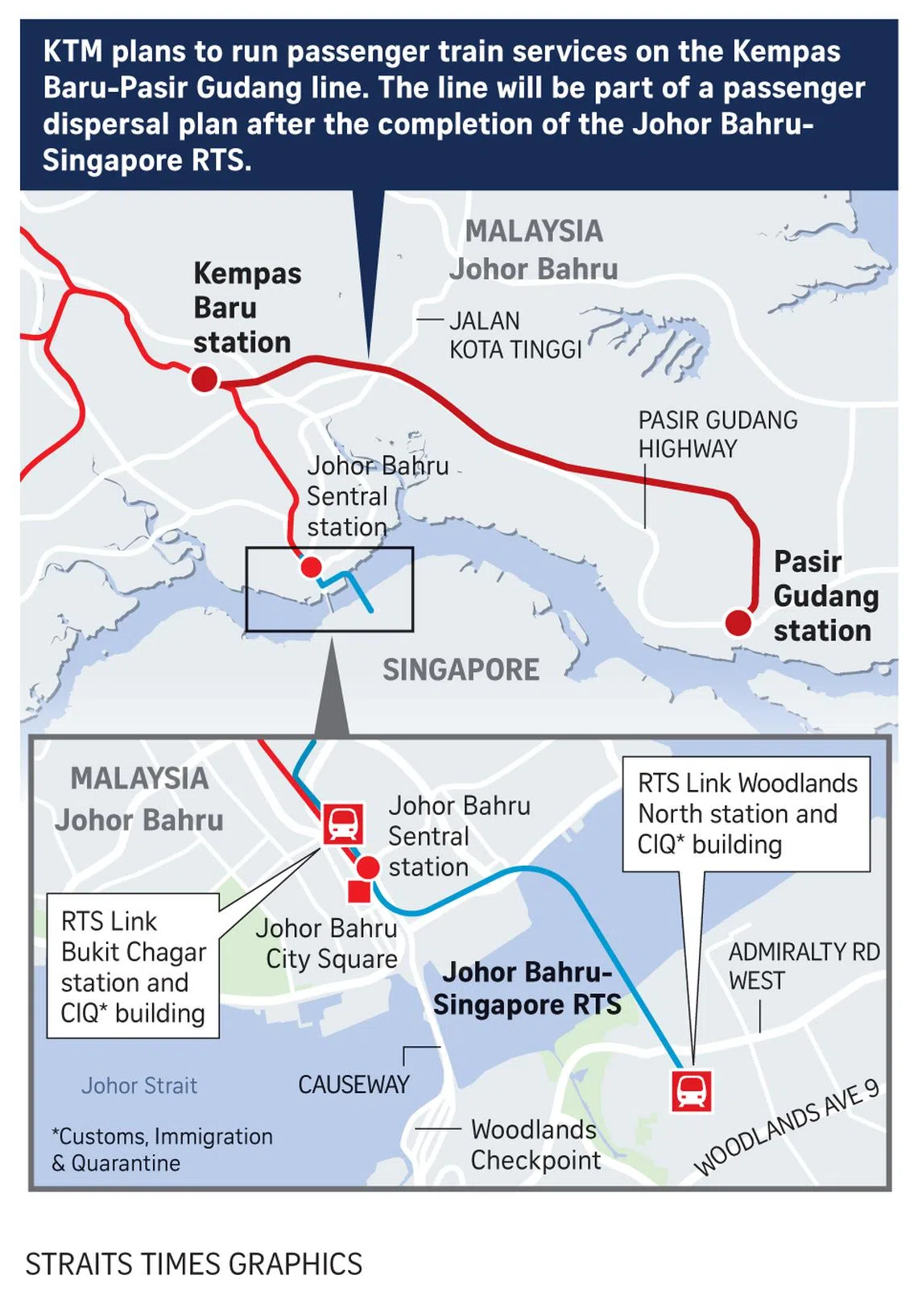KTM plans new passenger rail service in Johor Bahru to manage higher footfall expected from RTS
Sign up now: Get insights on Asia's fast-moving developments

Currently exclusive for freight service, Pasir Gudang KTM station is slated to run passenger service to Kempas Baru KTM station connecting to JB Sentral.
ST PHOTO: LU WEI HOONG
Follow topic:
- Malaysia's railway firm will operate a passenger service utilising the cross-border RTS project, potentially easing commuter traffic in Johor Bahru.
- The RTS, nearing completion, aims for a peak capacity of 10,000 passengers per hour, complemented by enhanced connectivity with JB Sentral.
- Planned infrastructure upgrades, including new halts and a passing loop, will be built to serve passengers service on the Kempas Baru-Pasir Gudang Line.
AI generated
PASIR GUDANG, Johor – Malaysia’s state railway firm is set to start a new passenger service line that will help disperse the flood of commuter traffic expected from the soon-to-be-completed Johor Bahru-Singapore Rapid Transit System (RTS) Link.
With the RTS scheduled to launch in December 2026,
“This will be the starting point for the Komuter Selatan (Southern Commuter train service), aligned with the completion of the RTS to help disperse passengers along the north-south travel corridor,” KTM chief executive officer Mohd Rani Hisham Samsudin told The Straits Times on July 22.
Once up, the cross-border RTS project, which can ferry an expected peak capacity of up to 10,000 passengers per hour per direction between Singapore’s Woodlands North MRT station and Bukit Chagar station in Johor Bahru, will lead to a significant increase in footfall in the area.
And while an earlier announcement said that a driverless tram-bus network, also known as an elevated autonomous rapid transit (ART) system, would be used to disperse commuter traffic in the Bukit Chagar area, there is no confirmation on its expected date.
The expansion of the KBPG line to include passenger services will tackle that issue. The first phase will introduce commuter stops at Kempas Baru and Pasir Gudang along the single-track line that has for decades been used to ship cargo – mostly cocoa and steel ingots – headed for Johor Port.
The second phase will see more proposed passenger stations along the KBPG line. With the expansion of Johor Port, the Pasir Gudang City Council estimates some 300,000 people to be working in the area by 2030, up from around 260,000 in 2020.
Other transport upgrades are also in the works to help deal with the potential increase in commuter traffic in Johor Bahru.
In future, commuters alighting at the upcoming Bukit Chagar RTS station will be able to connect via a 400m covered walkway to Johor Bahru Sentral (JB Sentral). They can then board passenger trains at the KTM JB Sentral Station to the KTM Kempas Baru Station and travel to places like Kulai and Kluang in the southern state.
And come December 2025, there will be another transport route linking up to JB Sentral. An Electric Train Service (ETS) is expected to begin operations there, completing the West Coast electrified rail route – operating at medium speeds of around 140kmh – from its northern terminus in Padang Besar to the southern terminus at JB Sentral, Transport Minister Anthony Loke told ST on July 29.
This will complement the planned ART system by dispersing commuter traffic to the Iskandar Puteri, Tebrau and Skudai regions. The final route and stations for the ART will be known by August, as announced by Johor transport executive councillor Mohamad Fazli Mohamad Salleh. The ART is an elevated, driverless tram-bus network that runs on tracks across bridges and viaducts.
Meanwhile, Railway Assets Corporation, which is in charge of upgrading the KBPG line while KTM operates the train service, told ST that details and costs of the new passenger stations are still being finalised.
KTM’s Datuk Rani, 63, said that infrastructure upgrade is necessary before passenger trains can be put into operation on the KBPG line.
“We need to build halts and raised platforms for passengers to board without making them climb the train. Secondly, the existing single track requires a proper passing loop and upgraded signalling systems to allow cargo and passenger trains to cross at the same time,” he said, adding that because the track is non-electrified, diesel trains will be deployed for the new passenger service.
Halts are small train stops, which do not provide the full range of services offered at train stations. And a passing loop is a portion of single track line that briefly splits into two or more tracks to allow trains going in opposite directions to pass safely.

KTM chief executive officer Mohd Rani Hisham Samsudin said that infrastructure upgrade is necessary before passenger train sets can be put into operation for the KBPG line.
ST PHOTO: LU WEI HOONG
Mr Rani said the plan is for the diesel-powered passenger trains to operate at 20- to 30-minute intervals during the morning and afternoon peak hours. This service could begin operating by the year-end, once the tracks and stations are upgraded or completed.
In the long run, he said the upcoming completion of the electrified double track along the Johor KTM stretch could pave the way for yet another passenger service, the electrified Komuter Selatan service, to operate between Paloh – a small town located about 130km north from Johor Bahru – and JB Sentral, alongside the higher-speed ETS.
From October 2024 to May 2025, the KBPG line underwent extensive upgrading works, including track replacement and a new signalling and safety system. This caused an extended closure and disruption of cargo transfers between Tanjung Pelepas Port in western Johor and Pasir Gudang Port in eastern Johor.
However, senior KTM locomotive driver Mohd Kamal Asmawi said the temporary closure was worthwhile to optimise train speed.
“It has helped significantly reduce the risk of derailment. We can now operate trains at up to 80kmh, compared to just 30kmh before,” said Mr Kamal, who has been serving on the KBPG line since 2020.



